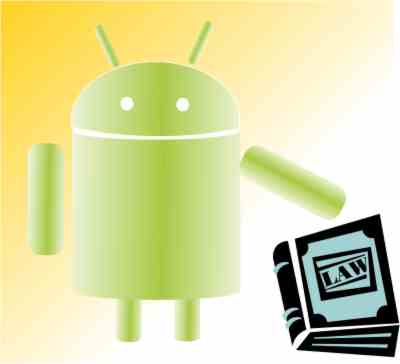| Supreme Court Refuses To Reconsider API Copyright Decision |
| Written by Sue Gee | |||
| Wednesday, 01 July 2015 | |||
|
In the latest twist to the Oracle versus Google lawsuit over Java and Android, the Supreme Court has declined to consider Google's petition to reconsider the issue of copyright, essentially finding in favor of Oracle.
The legal battle between Oracle and Google over the Android OS has been ongoing for almost four years. It was August 2010 when Oracle initiated its lawsuit against Google citing both patent and copyright infringements. After several delays the case to come to trial in April 2012 with the outcome that a jury unanimously denied all eight of the patent infringements asserted by Oracle but deadlocked on Google's fair use of copyright defence - which became redundant given that the judge in the case, William Alsup, ruled that the elements replicated by Google were "free for all to use under the Copyright Act". Oracle appealed and in May 2014 the US Court of Appeals for the Federal Circuit overturned the original verdict and outcome of the appeal was summed up as:
The parts that were affirmed find in favor of Oracle - upholding the district courts decision granting Oracle's motion for judgment as a matter of law (JMOL) regarding eight decompiled Java files that Google copied into Android. The parts that are reversed as also in favour of Oracle - denying Google's motion for JMOL with respect to the rangeCheck function, and more importantly reversing the the district court’s copyrightability and instead concluding that: The declaring code and the structure, sequence, and organization of the 37 Java API packages at issue are entitled to copyright protection. The final prong of the outcome was: Because the jury hung on fair use, we remand Google’s fair use
defense for further proceedings consistent with this decision.
Google then petitioned the Supreme Court to reconsider the issue of copyright and reverse the appeals court decision. It was backed by the Electronic Frontier Foundation (EFF) which filed an amicus brief on behalf of 77 prominent computer scientists, arguing, among other things, that copyrighting APIs would stifle innovation. Before deliberating the issues raised in Google's petition, in January 2015, the Supreme Court asked the US Solicitor General for the views of the Obama administration on the copyright question and a month ago the White House advised that APIs are copyrightable, a decision we found disturbing and disappointing, writing at the time: The Supreme Court doesn't have to take notice of the brief and could still decide for Google, but this now seems increasingly unlikely. Now the Supreme Court has taken notice of the Solicitor General's advice not to re-open this debate with this entry being recorded on its order list: 14-410 GOOGLE, INC. V. ORACLE AMERICA, INC. The petition for a writ of certiorari is denied. with the effect that the Federal Circuits verdict still stands. In reporting what it, and the majority of the developer community, consider bad news, the EFF reiterated: The Federal Circuit’s decision has been harshly criticized for its misunderstanding of both computer science and copyright law. APIs are, generally speaking, specifications that allow programs to communicate with each other, and are different than the code that implements a program. Treating APIs as copyrightable would have a profound negative impact on interoperability, and, therefore, innovation.
The Supreme Court's decision to deny Google's petition implies that it, like the Solicitor General, considers that APIs are copyrightable but it doesn't mean that the Oracle v. Google saga is over yet. Instead it means that the San Fransisco District Court will now hear the "fair use case" and we might still see another three rounds in the battle. Even if we accept that APIs are copyrightable,could Google's use of them be deemed to be acceptable?
The appeals court opinion also summarizes the three types of licence that Oracle makes available for Java and for Java APIs:
The condition that is common to all three licences is that the Java implementation must be inter-operable with Java - and this condition is not met by Android. The fair use case is going to be one that affects not just Google in its stance against Oracle but any developer who wants to use an external API. In a statement today, the EFF is looking for feedback from developers about the consequences of the Supreme Court's refusal to reconsider the copyright issue saying: we’re worried that litigious, well-heeled software companies will begin to threaten innovative developers with lawsuits, or demand license fees, when they create interoperable software by using or re-implementing an API. EFF is interested in hearing from software developers or companies that have received these kinds of threats or demands in the wake of Oracle v. Google.
More InformationBad News: Supreme Court Refuses to Review Oracle v. Google API Copyright Decision EFF Stands With Innovative Developers in the Wake of Oracle v. Google Related ArticlesWhite House Advises That APIs ARE Copyrightable Supreme Court Seeks Guidance On API Copyright Issue Computer Scientists Petition Supreme Court Over API Copyright Android Copyright Battle Goes To Supreme Court Judge Rules Oracle's Java APIs Not Copyrightable Oracle v. Google: Jury finds No Patent Infringement Oracle v Google Judge Is A Programmer! Oracle v Google - Are Computer Languages Copyrightable?
To be informed about new articles on I Programmer, sign up for our weekly newsletter, subscribe to the RSS feed and follow us on Twitter, Facebook, Google+ or Linkedin.
Comments
or email your comment to: comments@i-programmer.info |
|||
| Last Updated ( Tuesday, 29 March 2016 ) |



